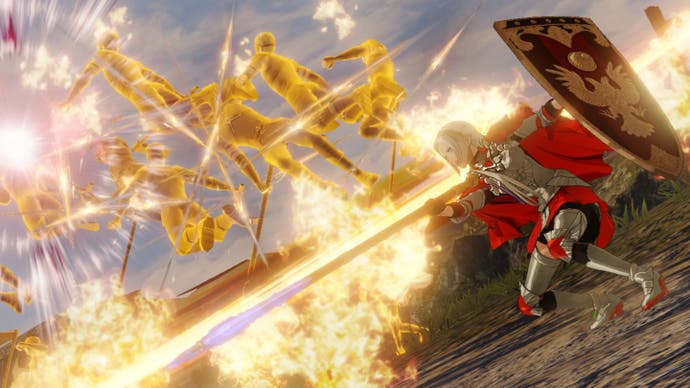Fire Emblem Warriors: Three Hopes review ¨C one of the strongest musou games yet
Claude blimey!
I've had a fantastic time returning to Fódlan. Three years since we first visited this warring continent, Nintendo's brought us back to the world of Fire Emblem: Three Houses once more. Unlike the original Warriors spin-off, though, this isn't another "Best of Fire Emblem" mashup. What you'll find is a faster paced take on the Fódlan war, revisiting familiar story beats with fresh twists in a way that'll likely please Three Houses fans. Playing the original isn't required, though you'd undeniably get more from this. Honestly, I've never had this much fun with a musou game before.
Set in an alternate timeline, we're not controlling Byleth this time around, though they aren't exactly absent. Playing a new mercenary called Shez, a surprise encounter leads to you enrolling as a student at Garreg Mach Monastery and like before, your choice of student house determines your storyline. That's split between Edelgard's Black Eagles, Dimitri's Blue Lions, and Claude's Golden Deer, and I chose Claude. You won't get the entire story without playing each route, so I'm thankful they don't take as long to complete by comparison - Golden Deer for instance took me 35 hours, and I felt completely invested throughout. Don't get too comfy in academy life, though; our student days prove brief before jumping two years ahead.
Away from combat, Shez spends their free time in a war camp, travelling between facilities on foot. There are no side tasks and fishing is tragically missing, but you'll otherwise find a faithful recreation of Three Houses' social mechanics that have been slightly trimmed down. Beyond camp conversations, you can invite allies to camp meals, go on expeditions together, carry out camp chores, offer allies gifts, and plenty more. Just don't expect romance this time, as support levels cap at A-rank. Still, even if your relationships aren't always front and centre, I appreciated how Three Hopes ensures everyone gets their moment in this new setting, never forgetting what we loved about these characters. It's worth noting that you can't recruit characters from different houses before the timeskip, though select battles provide the option.
Once you've finished preparing, our next stop is the war map, which usually mandates the conquering of two regions before you reach the main battle of the chapter. Heading straight to the main objective is certainly an option, it just isn't necessarily the most beneficial. Each region provides differing loot once conquered, including new weapons, items, money, and new strategies, which means there's great incentive to explore, rewarding anyone that's thorough.
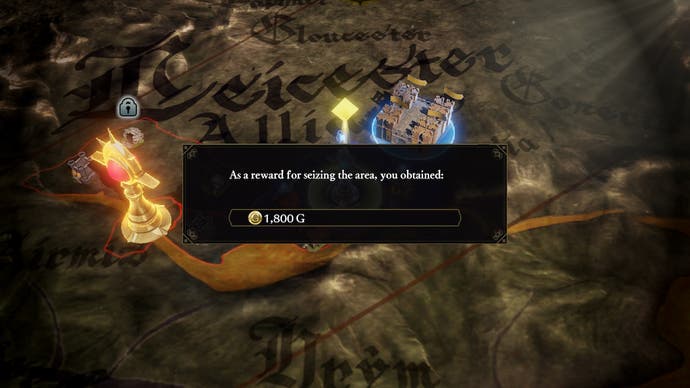
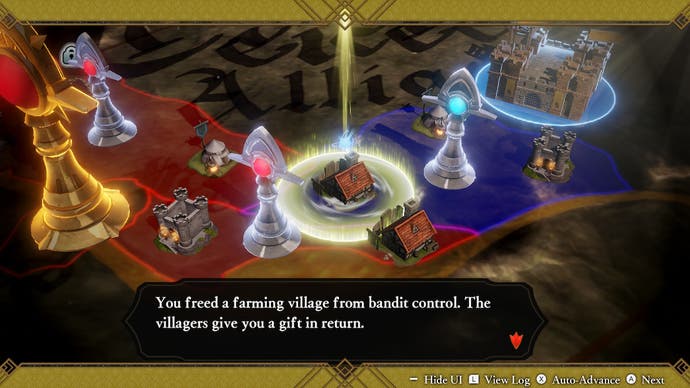
Every region claimed earns strategy resources - points used towards picking strategies for the big fight. Similar to Secret Plans in Dynasty Warriors 9: Empires, this provides some interesting options that can get rather inventive. You can take the practical approach by strengthening strongholds, sabotaging the enemy, or assigning allied units for protection, alongside more creative opportunities like adjusted formations. I won't spoil what some of them provide, but since you can't choose every option going, it's a great chance to get inventive as a commander.
As for the main combat, anyone who's played a musou game before knows exactly what to expect here. Letting us pick four playable characters per mission, we're still mowing through countless hordes with a few button presses, charging up that Warrior gauge for ridiculously powerful hits. Every character has something called an Awakening Gauge, too, which takes longer to fill. Once done, activating puts you in an enhanced state: you can't die, bonus damage is awarded based on enemies killed, and like the Warrior Gauge, you can trigger a special attack for tremendous damage. You become an unstoppable force, it makes you feel even more powerful, and that's quite the feat for a game already treating you like a super soldier.
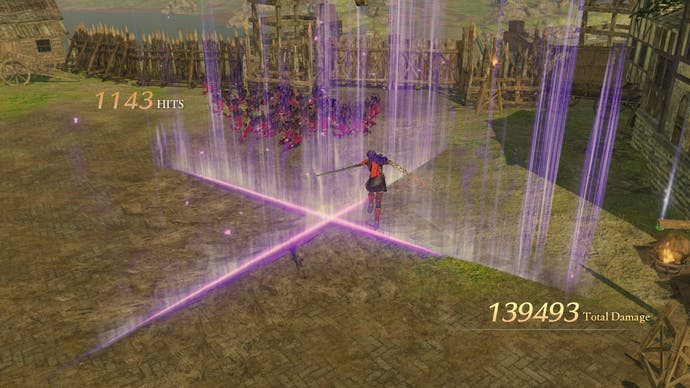
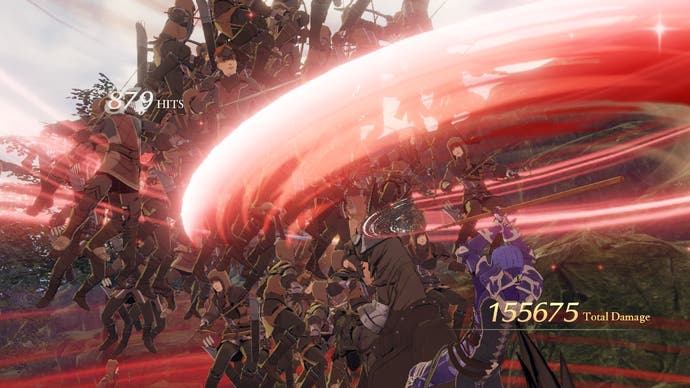
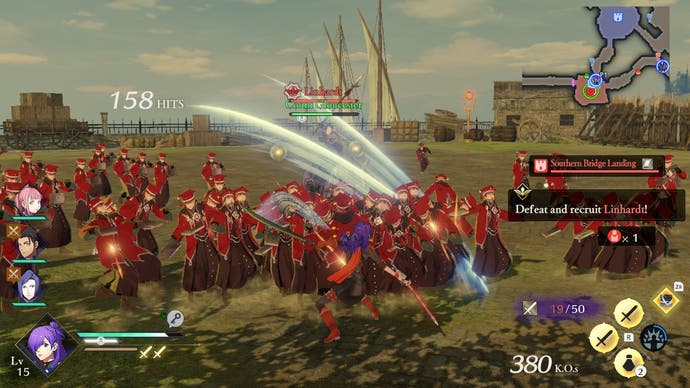
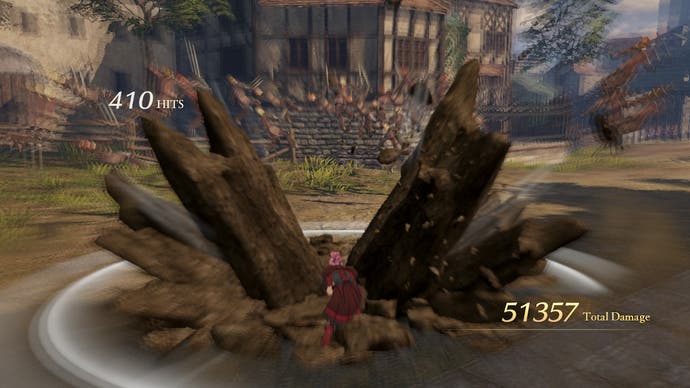
Each map has enemy outposts that need capturing to reinforce your position, often manned by a strong enemy commander. Don't forget those new objectives that keep popping up, requiring you to be adaptable. Unlike main battles, these smaller-scale engagements don't keep things as varied, so this becomes slightly repetitive. Thankfully, Three Hopes' strategic approach helps quell this. Troops can be ordered towards certain targets, defending key areas or going all in on particular units. That requires pausing the action and choosing from the menu which, despite sounding like it might interrupt the action, actually feels surprisingly well-integrated here. Not only does this add some necessary depth, it really captures the spirit of Fire Emblem's turn-based action, which felt refreshing.
Furthermore, special attacks are limited by durability, like we see in most Fire Emblem games. That thankfully doesn't apply to standard attacks, as let's face it, that'd be a nightmare enforce across battles. Depending on your class, each unit has specific weaknesses against certain weapons or attacks, clearly indicating who's got the advantage on the map - don't say you weren't warned when you decide to send flying units towards an archer.
Three Hopes is clever, inventive, keeps life entertaining outside of battles, and there's surprising depth to its strategic gameplay.
Also present from Three Houses is the way each unit can take exams to learn a new class. This time, there's no chance of failing said exams, and so once undertaken they'll teach your selected character class-specific moves, combat arts, and more. While Three Hopes suggests a recommended class for each unit, you can place them in whichever class tree you wish, gradually working towards more advanced classes.
Three Hopes doesn't revolutionise musou's formula, so if you're dead set against this style of combat, it probably won't change your mind. However, it feels like a reinvigorated approach to this genre, and I loved how it balances strategy with more action-driven combat. Three Hopes is clever, inventive, keeps life entertaining outside of battles, and there's surprising depth to its strategic gameplay. Most importantly it's a lot of fun - far from a quick cash-in on Three Houses' success, that may have been a concern for some.
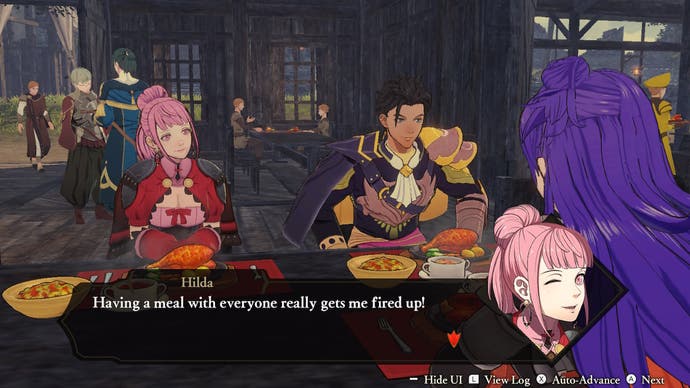
Better still, if you're worried about performance problems, fear not. There's no doubt it's targeting 30 frames per second and between handheld/docked mode, Three Hopes usually achieves this. I spotted a few framerate drops when the action gets especially heavy, even by musou standards, but these instances were few and far between. It's a significant improvement on Hyrule Warriors: Age of Calamity and, evidently, Omega Force has listened to previous complaints.
I'll likely be playing Three Hopes for a long time to come - I've already begun my Black Eagles New Game+ run - and when I previously said this isn't just Dynasty Warriors with a Fire Emblem skin, I meant it. Three Hopes is genuinely impressive. It walks a fine line between freshness for existing fans and approachability for new players, and personally it's had me invested from the start. I'd love to see where Nintendo's musou spinoff concept goes next.
